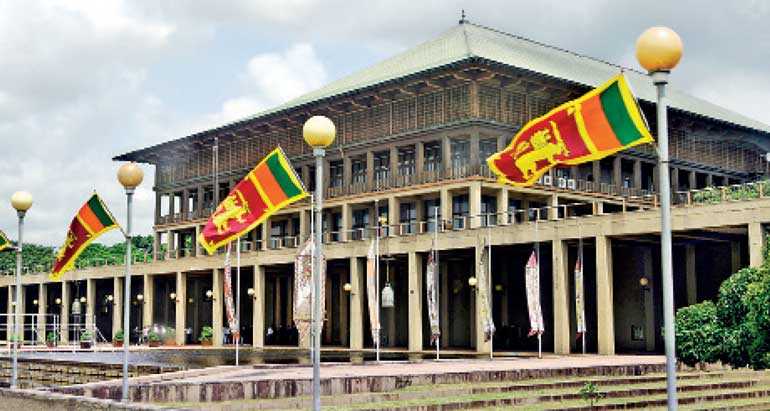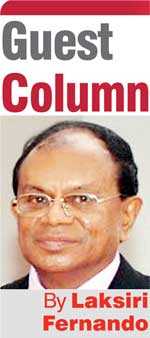Friday Feb 27, 2026
Friday Feb 27, 2026
Monday, 28 December 2020 00:00 - - {{hitsCtrl.values.hits}}

Many considered democracy to be a given thing or limited to holding elections, running political parties, following or drafting a constitution and at best developing the economy. Therefore, there was no conception of democratisation except during certain limited periods on the part of who wielded power at the expense of the people. There is no surprise that the democracy index of the Economist characterised Sri Lanka as a ‘flawed democracy’ with a ranking in the 69th position this year – Pic by Shehan Gunasekara
Although we boast about Sri Lanka as the oldest democracy in Asia, our system has never been developed like many of the democratic countries in the world. Perhaps the main reason taken for this  flawed characterisation is the universal franchise introduced in 1931. While the introduction was a major democratic development in the island, it should be mentioned that many of the so-called national leaders, except like A.E. Goonasinghe, did not support or rather opposed this introduction.
flawed characterisation is the universal franchise introduced in 1931. While the introduction was a major democratic development in the island, it should be mentioned that many of the so-called national leaders, except like A.E. Goonasinghe, did not support or rather opposed this introduction.
What does this mean? Democracy in Sri Lanka is primarily a plant that was implanted from overseas and it grew with much difficulties (distortedly) within a soil that was not so fertile for its natural growth. For a proper democracy, there are certain economic conditions necessary. More than such economic conditions, the society should be prone to such democratic developments through education, people’s movements, cultural change and leadership. These were the perennially lacking parts in the democratic jigsaw in the country.
On the other hand, while Australia introduced universal franchise in 1902, New Zealand opted for its introduction well before in 1883. Why don’t we consider these countries as Asian? At least from a democratic-development point of view, these two countries should be considered as countries in our region from where we could learn a lot for democratic principles and practices although these countries then or now are not perfect in terms of democracy or in other ways.
International and national conditions
No country in the world is complete/perfect in terms of democracy. A primary reason for the situation is democracy has so far not penetrated the economy. In some countries, while politics may be democratic, the economies are not. This is a major paradox and contradiction. The poor people are still suffering in democratic countries all over the world although they have free and fair elections and universal franchise!
The argument that democracy will eventually bring economic equality (or equal economic opportunities) has not materialised. Equality before the law undoubtedly is admirable under liberal democracy. But without reasonable economic fairness that right appears hollow. Neo-liberalism has virtually brought an antithesis to democracy which might give birth to even fascism in a democratic country.
While many liberal advocates have focused on democratic forms, very little discussions have taken place on the questions of democratic substance. This is also the case in Sri Lanka. Without a level playing field in terms of economic opportunity and social recognition, irrespective of ethnicity, religion, gender, region or any other distinction, there is no substance in democracy. Sri Lanka has still failed to eliminate caste distinctions or discrimination. The caste distinctions/labels should be completely abolished/prohibited. The National Human Rights Commission should be given more powers in this regard.
Instead of ameliorating ethnic and religious conflicts, the ‘majoritarian democracy’ and ‘partial minority rights movements’ have exacerbated these conflicts throughout years. Almost all political leaders have failed in this regard. There is a need for lateral thinking in this respect and promoting religious leaders to play a major role through inter-religious dialogue might be one proposition. All religions claim they are spiritual and stand for peace and what is moral!
This does not mean that issues of democratic forms are not important. However, even those should not be limited to, for example, a need for a new constitution, presidential vs cabinet, unitary vs devolution/federalism debates or even regime change. All these and other issues of democratic forms are linked to what those could deliver to the people in terms of human freedom, economic opportunity, equal social recognition and peaceful living.
The UN has made a major mistake after its formation without coming up with a Declaration on Democracy, the principles of democratic substance included. It repeatedly says, “The UN supports democracy by promoting human rights, development, and peace.” Is that sufficient?
Human rights debates have taken antagonistic forms, instead of being constructive dialogues, at the Human Rights Council and beyond. If there had been a UN Council for Democracy, in addition to the Human Rights Council, many of the human rights problems could have been resolved differently. While the Universal Declaration on Democracy declared in 1997 by the Inter Parliamentary Union (IPU) is admirable even it has failed to address some of the main questions of democratic substance. Therefore, there is still a vacuum on the need for a universal declaration on democracy.
When the IPU declared the Universal Declaration on Democracy, Sri Lanka was an active participant. Even China was there! However, the commitments in this regard or on the declaration were not followed up. People in the country are largely unaware of this democratic declaration. I even wonder whether the parliamentarians were/are aware of it! This was not translated into Sinhala or Tamil. It is still not too late, although this declaration might not be considered the final truth.
From international to national
The democratic development of a country can be considered governed by four major processes. (1) Political mobilisation for democracy. (2) Democratisation through institutional, constitutional and policy changes. (3) Economic development and income re-distribution. (4) Recognition and adoption of international democratic developments. While all these processes are important, what processes might be more important, or in what combination, would depend on a particular condition and situation.
In the case of Sri Lanka, the absence or weaknesses in political mobilisation for democracy can be considered the major lacunae from the beginning. Even for political independence from the colonial rule, there was no proper political/democratic mobilisation. Most of the political formations, except in the case of the Left, were for power for this or that economic/elite or ethnic group. There was hardly a vision going beyond ethnicity or religion. Even in the case of the Left or ultra-left, the commitment for democracy was poor or absent.
Many considered democracy to be a given thing or limited to holding elections, running political parties, following or drafting a constitution and at best developing the economy. Therefore, there was no conception of democratisation except during certain limited periods on the part of who wielded power at the expense of the people. There is no surprise that the democracy index of the Economist characterised Sri Lanka as a ‘flawed democracy’ with a ranking in the 69th position this year. This is also with the United States (25th position) and India (51st position) in the same category. However, it is possible that Sri Lanka is soon degenerating into a ‘hybrid’ or an ‘authoritarian’ system. According to the index, only five steps remain before falling into that category! That is the interpretation of the Economist, but our interpretation or experience might be different.
Under the circumstances therefore, democratic defence is the most important task followed by and along with democratic promotion. Just defence of democracy might not be that attractive with negative connotations although it is a primary task. But democratic promotion with appealing new ideas and focusing on people’s economic demands could be more popular. What should be advocated is not just institutional/constitutional change, but policy changes not only for democratic promotion but also for economic justice for the poor and the marginalised. Women are an important marginalised section who could be mobilised for democratic change and promotion. However, such a movement should not be limited to the urban or elite women. One demand and policy change towards that direction could be for a universal basic income for everyone in the country with equal opportunities for men and women.
There is no doubt that when a democratically elected, yet an authoritarian government is in power, opposing that government is a primary duty of all citizens against the government’s authoritarian measures like the 20A or Maharagama prison shooting. This does not however mean calling for an uprising or resistance. The opposition to the regime should be democratic and peaceful.
The possibility of democratic change against an authoritarian government was successfully shown at the 2015 presidential elections, even under the ‘flawed democracy.’ What went wrong was not only the type of neoliberal regime that was installed, but also the weaknesses of the civil society movements that spearheaded that change. When the Yahapalana Government was going against the mandate, those organisations did not have the strength or determination to oppose.
Thus, is the need for more broader, people based and a genuine democratic movement without aliening with this or that leader or party of the present opposition. This would not preclude the need or the possibility of issue based united actions and activities with any of the opposition parties/leaders. The complete submission or reliance of those parties are not warranted. At the same time, such a democratic opposition should and could have dialogues or even negotiations with the parties, leaders and more importantly the second-tier organisers of the present government.
The protection and promotion of democracy in the country is a common cause. That is the way it should be put forward. No one should be excluded except in the case of attempted sabotage. One of the most important democratic issues of the present situation is the not holding of Provincial Council Elections for some years now.
‘Hold PC Elections Soon’ could be the demand.
It is not only about the form, but about the democratic substance. For a healthy democracy, and for minority rights, elected representatives and councils are important at various levels. Whatever the present weaknesses, important policy and administrative decisions/measures are left with the provincial councils.